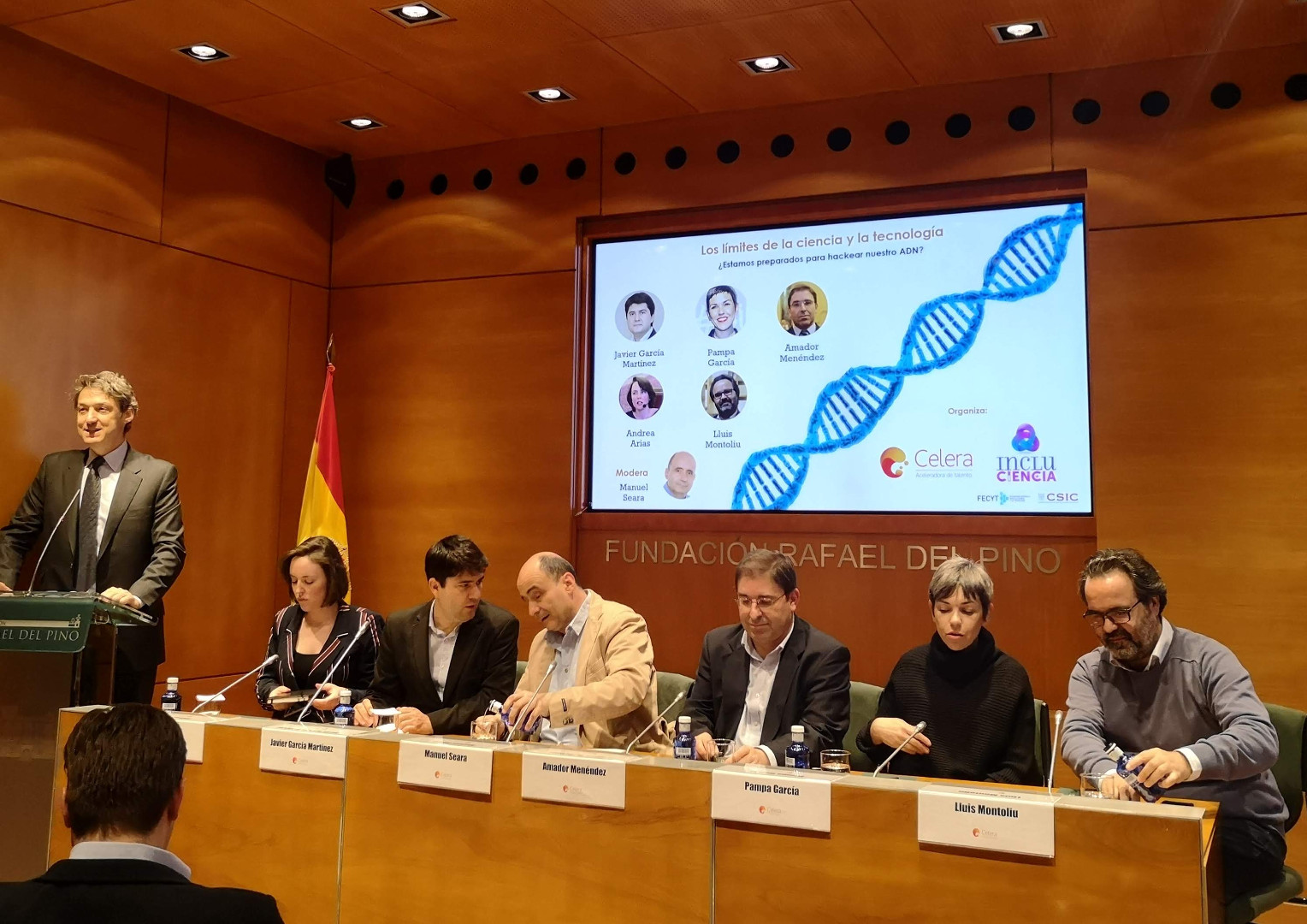
On 4 April, on the occasion of the 2nd edition of the Young Populariser Awards, a round table on The Limits of Science and Technology was held. The event was organised by Celera with the collaboration of Incluciencia, Rewisor and Principia, at the Rafael del Pino Foundation, with speakers of the stature of Pampa García, Lluis Montoliu, Javier García, Andrea Martos and Amador Menéndez. The round table was introduced by Vicente Montes and moderated by Manuel Seara, who, after making the relevant presentations, posed the question: should limits be placed on scientific knowledge?
In recent years, great advances have been made in CRISPR-Cas genome editing technology. However, it is not yet sufficiently efficient to, for example, reverse pathologies in experimental animals. Moreover, this technique is not fully specific and can lead to unwanted mutations, which is why its use in humans is currently unsafe and prohibited.
A few months ago the scientific community was shocked by a news story: a Chinese scientist claimed to have created the first genetically modified babies. Apparently, the twins' father was HIV-positive, so he and his partner resorted to artificial insemination. What they didn't know was that the team of scientists who assisted them had taken the liberty of editing the embryos' genome in order to inactivate one of the genes that the virus uses to infect the immune system and thus protect them from the disease.
Unsurprisingly, this affair transcended society at large and provoked a great deal of controversy. Firstly, because the lives of the babies were put at risk. Secondly, because the parents did not give their consent and had no knowledge, and the scientists bypassed the country's legislation. And finally, because it opened the door to the debate on eugenics, or creating babies "à la carte". The line between modifying genomes to prevent a pathology and to correct a defect or "improve" the species is a fine one and has been discussed for decades.
"There is no question we should not answer".
Javier García
The case of the CRISPR twins is a good example to illustrate the dilemma raised by Manuel Seara and was a recurring theme during Thursday afternoon. Lluis Montoliu commented that not everything should be done simply because the advance of technology allows it. He believes that the scientists' guild is no different from any other, that we should also be regulated. Pampa García pointed out that limits should not be imposed on scientific knowledge, but on how to use it, on its applications. Javier García agreed: "There is no question we should not answer". However, he added that even if there is (much needed) regulation, this does not mean that scientists cannot act irresponsibly, as happened with CRISPR in China.
Later on, Andrea Martos made a very interesting reflection: "You cannot regulate the limits of science if the society concerned is not informed about scientific advances". And given that "the advance of science is exponential, at the moment it is very difficult to be aware of all the advances, so it is difficult to carry out a social debate and subsequently regulate". This is where science communication and popularisation play a fundamental role. However, according to Javier García, a better informed society does not necessarily make better decisions because we are emotional and not rational beings. He gave the example that in France 40% of the population does not believe in vaccines.
This topic led the speakers to talk about Science in Parliament, which aims to provide politicians with the tools of science so that they can make decisions and develop evidence-based (or at least evidence-informed) policies. This initiative was very well received by parliamentarians and, after organising a series of conferences in the Congress of Deputies, led to the approval of the creation of a scientific advisory office for the Spanish Parliament.
In relation to the other side of the debate, the limits of technology, Amador Menéndez indicated that often the limits are imposed by technology itself. He explained how artificial intelligences are proliferating, which are becoming very efficient at solving complex problems much better than human beings, who may find them unmanageable. However, he said this is what is known as "narrow artificial intelligence", oriented towards a specific issue and unable to adapt to other situations. He believes that "general artificial intelligence" is a long way off and that we will probably never develop it. Thus, he does not believe that we can be completely replaced by machines.
Afterwards, it was the turn of the audience, which had filled the room to capacity and was very participative. It is worth noting the presence of many young people, as the round table was, after all, part of the Young Disseminators prize-giving ceremony. There were questions of all kinds and of all ages, which helped to consolidate the knowledge and ideas acquired during the debate. A new topic also emerged, related to the "spying" to which we are constantly subjected by the use of mobile phones. In this respect, the contrast in perspective between generations is disturbing: for those for whom technology is something acquired, this "control" is alarming and unacceptable. However, young people, who were born with a mobile phone in their hands, consider it a small price to pay for the enjoyment of carrying the "knowledge of humanity" in their pockets.
Finally, the videos of the competition winners were shown and María Polo, the new director of Celera who takes over the baton from Francisco Martínez, presented the prizes.


